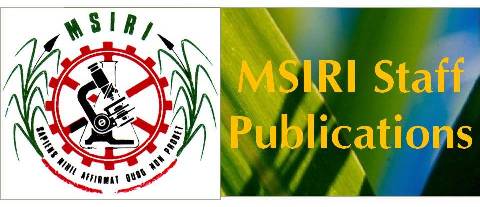Sugar cane fields: a disposal route for organic wastes?
| MSI03P3939 | |
| Ng Kee Kwong, K. F. Bholah, M. A. Toory, V. | |
| Sugar cane fields: a disposal route for organic wastes? | |
| ISSCT Agronomy workshop: Opportunities in sugar cane agronomy to confront the new realities emerging in the 21st century, 21-25 July 2003, MSIRI, Mauritius: Program and Abstracts | |
| book chapter | |
| 2003 | |
| p. 32 | |
| Reduit: ISSCT and Mauritius Sugar Industry Research Institute | |
| En | |
| En | |
| More stringent regulations will emerge to protect the environment from the increasing organic wastes being generated. Of all the disposal options available, only agricultural re-use of these organic wastes produces economic benefits as the wastes contain plant nutrients and act as a soil conditioner. However, agricultural re-use warrants careful considerations because the wastes contain heavy metals and other unwanted constituents and high application rates may result in excessive nitrogen (N) mineralization and increases in NO3 levels in water which can be hazardous to man and animals. Agricultural re-use of organic wastes in sugar cane fields was studied in lysimeters and field trials using sewage sludge as the source of organic waste. Rates of sewage sludge from 0 to 60 t/ha were compared against the standard practice of applying mineral N fertilizer at 140 kg/ha to sugar cane. Determination of Cd, Cr, Cu, Hg, Ni, Pb and Zn in leachates showed concentrations below detection limits even when sewage sludge was applied at 60 t/ha. Thus, sewage sludge disposal on sugar cane soils in Mauritius presents little risk of groundwater contamination by heavy metals. Furthermore, concentrations of heavy metals in sugar cane treated with sludge at 60 t/ha were not significantly higher than in the control plot. Repeated yearly applications of sewage sludge would, in the long term, not cause any appreciable rise in the concentrations of heavy metals in sugar cane. Additionally, sewage sludge at the higher rate of 60 t/ha produced lower nitrate concentrations in the root zone relative to the standard 140 kg/ha application of mineral N fertilizer. The results of this study suggest that sugar cane fields can provide a safe outlet and a sustainable option for the disposal of organic wastes. | |
| Heavy metals nitrate pollution sewage sludge sugarcane | |
| Mauritius | |
| Sugarcane: Soils and plant nutrition | |
| Fertilization: organic wastes: sewage sludge | |
| 2003-07-31 | |
| En | |
| MSIRI | |
| LIB | |
| CHEM |
